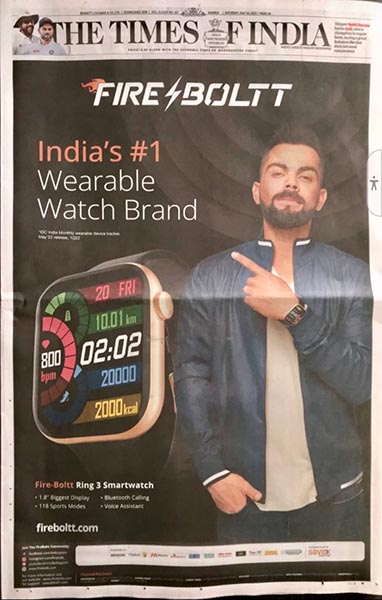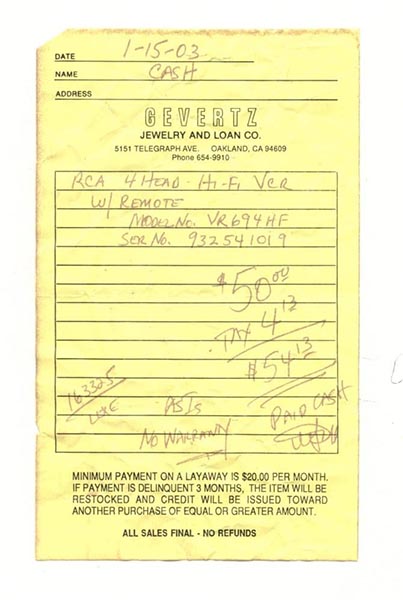Your Friday Chinese Zither cover of “Thunderstruck”
Graphene Gets Ink On Its Hands—Or Vice Versa
Was it a good week for graphene news? It’s always a good week for graphene news! This one is right up our alley: graphene ink! HydroGraph Clean Power launched a graphene ink intended to be used in the production of inexpensive, foldable, and wearable electronics.
“Once the ink is made, it can then be deployed in regular inkjet printers to make small-scale, flexible electronics. This puts manufacturing capabilities into the reach of many, making it far more accessible,” said Dr. Chris Sorensen, HydroGraph vice president R&D.
Eight Hearts Beat As One
Our fiery Atlanta correspondent points us to a bizarre ad featuring famous cricket player Virat Kohli advertising Fire Boltt’s new smartwatch:

What’s so weird about that? Well, unless Kohli really gets anxious while having his picture taken—or he has the metabolism of a squirrel—the heart rate of 800 beats per minute (bpm) is a tad unrealistic. The average heart rate for adults ranges between 60 and 100 bpm and even if he were in the middle of a vigorous game, it probably wouldn’t be any higher than maybe 130. So either the ad designer took a bit of liberty with Kohli’s cardiac performance or the watch is wildly inaccurate.
Retiring Numbers
Also from the Peachtree State comes this intriguing item about how, for one newspaper, a small retirement community is a better market than Atlanta.
…William Turvill at Press Gazette had pulled together the list of the 25 American newspapers with the highest print circulation. (The data is from the Alliance for Audited Media.)
Let’s start with the good news on the list! (It won’t take long.) The Villages Daily Sun made the Top 25 for the first time, coming in at No. 23. The Villages is “Florida’s Friendliest Active Adult 55+ Retirement Community,” a place filled with the target audience for print newspapers. (You can leave Ohio, but you can’t leave a lifelong reading habit, I guess. Here’s a good profile of the paper from 2018.)
To put it another way: The Villages Daily Sun is located in a metro area of 129,752 people. But it sells more print copies on an average weekday than the:
— Milwaukee Journal Sentinel (metro population: 2,053,232),
— Pittsburgh Post-Gazette (2,657,149),
— Charlotte Observer (2,822,352),
— The (Baltimore) Sun (2,844,510),
— St. Louis Post-Dispatch (2,909,003),
— The (Portland) Oregonian (3,280,736), or
— The (Cleveland) Plain Dealer (3,633,962).
Or take an even bigger market: Atlanta, the 10th largest metro area in America, with a metro population of 6,930,423. On an average weekday, The Atlanta Journal-Constitution sells 49,243 print newspapers. The Villages Daily Sun sells 49,183.
The main thrust of the article, however, is that print revenue still outpaces digital, although probably not for much longer:
Is it really digital ad revenue "surpassing" print if it's really just digital ad revenue staying flat for a decade while print collapses?
— Joshua Benton (@jbenton) June 22, 2022
"I surpassed Bol Bol in height that one time he took a nap"https://t.co/NAUBdPdYrY pic.twitter.com/Qq1t80yjGS
And it looks like the print/digital gap isn’t so much a case of digital surpassing print, as print just deteriorating.
Distinctly Average
Hey, magazine publishers, Boing Boing has a great new title for you:

We’d subscribe!
Putting the “OOH!” in Out Of Home
If you were in Times Square recently, you may have caught sight of/been terrified by the latest “3D billboard” for the film Resident Evil. Via Boing Boing:
The billboard is amazing. Disturbing. Creepy. That creature escapes its cage and literally jumps out at you. Ok, not literally. But it sure looks like it.
Lost Found in a Good Book
Probably all of us have gotten lost in a book at one time or another (or perhaps quite often), but any librarian can tell you that things often get lost in books. Yes, library books have often come back with all manner of objects left between their pages. The Oakland Public Library has been collecting them, as part of a project called “Found in a Library Book.” The project page organizes found objects by type, such as Art (usually children’s drawings, but some adults’ as well), Notes, Photos, Card and Letters, and much more, as well as one catch-all category called Artifacts which can include bills, playing cards, maps, even what look like pawn shop receipts.

How many of these items were left deliberately (notes, letters, etc.) or by accident (the ersatz bookmark that got left behind) is unknown, but it is an interesting peek into human behavior.
Free-Range Librarians
Here’s a western we’d love to see: The Horseback Librarian. No, really, there was such a thing. During the latter part of the Depression (1935–1943), as part of an effort to combat illiteracy, the Pack Horse Library Project was a New Deal-funded initiative that sent female librarians on horseback (or muleback) to deliver books to rural Appalachian counties in eastern Kentucky. Via Laughing Squid, UntoldEdu recounts the history of these horseback librarians.
The initiative employed around 1,000 book women as mobile librarians. paid less than a dollar a day…in just one year they reached 50 000 families and 155 rural schools.
One intrepid librarian hiked 18 miles after her mule died. Check them out:
We don’t want to know how they collected late fees.
Don’t Fear the Umlaut
Over at Mental Floss, a look at the umlaut, the two dots over a letter that seems to have struck a chord with no small number of hard rock and metal bands—a number of which were unaware that the umlaut is actually a type of diacritical mark that alters the pronunciation of a letter. The umlaut was given its name by the Brothers Grimm after the words um (around) and laut (sound). Primarily used in German, but also in Hungarian among other languages, the umlaut alters a vowel’s pronunciation and changes the meaning of a word—for example, schon means “already,” but schön means “beautiful.” It is often confused with a diaeresis, which also consists of two dots placed over the second of two consecutive vowels to indicate that the second vowel should be pronounced differently than it looks, or to replace a hyphen—for example, co-workers vs. cöworkers in lieu of coworkers, if you wanted to remove any bovine implications. Naïve is also another example, although the word is familiar enough that we usually get by without the diaeresis and know it isn’t pronounced “nave.”
Anyway, back to the umlaut. In English citations of German words, it is not uncommon to see ü replaced by ue, especially if you are a Wayne Newton fan—“Danke shön” is rendered in song as “Danke Shoen,” especially back in the days when it was not easy to add an umlaut using a typewriter or other typesetting system.
For some reason—perhaps because it looks cool—the umlaut was seized upon for band names. The first to do this was actually a German band: Amon Düül, an art commune that turned the umlaut up to 11 by putting two in a row.
The first popular band (at least in America) to add an umlaut was Blue Öyster Cult.
The band adopted the style in 1971 after several other band names—Soft White Underbelly and Travesty among them—didn’t seem to resonate with fans. The Cult did, especially when it merged with the umlaut, the result of band manager Sandy Pearlman and rock writer Richard Meltzer standing outside a restaurant serving Blue Point oysters.
“I said, ‘Why don’t we call it Blue Oyster Cult?’” Pearlman told Rolling Stone. “And Richard said, ‘And we’ll add an umlaut over the O!’ And I said, ‘Great!’”
The band agreed. “I think the umlaut had a bit of tongue-in-cheek humor about it,” founder Eric Bloom said in 2013. “Plus it made the band’s name look cool in a way.”
BÖC was a big influence on a later metal bands, and by the end of the 70s, the Heavy Metal section of the record store was downright dotty—Motörhead, Queensrÿche, and Hüsker Dü (though they were not heavy metal, and the game from which they took their name was umlaut-less). Mötley Crüe got a big surprise when they first played Germany:
“the crowds were chanting, ‘Mutley Cruh! Mutley Cruh!’ We couldn’t figure out why the f**k they were doing that.”
Our favorite has to be metal parody band Spinal Tap, whose addition of the umlaut over the “n” is so incorrect that the Mac keyboard won’t even type it. So we’ll call them Spineal Tap.
A Sign-Up of the Times
A pox on both your infectious diseases! This just in:

No, we’ll take our chances, thanks. The messages would probably be worse than the disease.
Umpire State
Probably since the first day that the game of baseball was ever played, fans have complained about umpires’ calls. (The same could be said of officiating in virtually any sport.) What’s the solution? Optometry exams? How about “robot umpires”? What could possibly go wrong? From Gizmodo:
A new Morning Consult poll released this week found 48% of self-described U.S. baseball fans said they support the implementation of robotic umpires capable of automatically calling balls and strikes. That’s compared to just 32% opposed.
Is baseball known for its cutting-edge technological innovation? Not really, and that has generally been how fans of the game like it. But, perhaps that’s changing.
Umpire interpretations of strike zones are notoriously fickle and inherently subjective. The technology to replace those umpires with precise robotic systems has existed for years, but fans and players have balked at the idea, with many seeing it as removing a crucial human element from the sport. MLB Commissioner Rob Manfred has said he’d like to see some form of robo umpires implemented by the 2024 season.
Wait until someone figures out how to hack into them. That’ll make for an interesting game…
The Clue of the Mosquito’s Blood
This is an episode of CSI we’d watch. Via Boing Boing:
In the Chinese province of Fujian, police were investigating a burglary at an apartment complex. Apparently, the apartment was empty but police found evidence that the burglar had cooked a meal and spent the night. The cops also noticed a squashed mosquito on the wall and took a blood sample.
They analyzed DNA from the blood and found a match in their system who had a list of priors and had been arrested in another city in Fujian Province a month earlier. To top it off, he was also linked to three other burglaries—and has since confessed. Case closed.
Pro tip for burglars: don’t stay at a break-in long enough to be bitten by a mosquito.
The mosquito could not be reached for comment.
AI-Yi-Yi, Part the Infinity: Pussy Galore
Here’s a spit-take-inducing headline from Axios: “Cat lovers are spending hundreds on AI litter boxes.” Hopefully for their cats…Yes, for their cats:
That familiar plastic tub filled with clay litter is morphing into an AI-powered hardware/software platform that includes a scale to weigh what Tabby has been doing (and detect if she's putting on pounds), an app that alerts when she's done her business (and tracks the frequency) and health-monitoring litter that can flag urinary tract infections or other problems.
Such as?
The Litter-Robot 4 — which will ship in August — is a Wi-Fi-enabled, automated, self-cleaning box connected to an app, so you can monitor your cat's weight and bathroom habits.
The product — the most advanced on the market — is “a software platform enabled by hardware” that will “continually evolve for the next decade," says Jacob Zuppke, president and CEO of Whisker, which makes the Litter-Robot.
How does it work?
“I was one of the beta users of the Litter-Robot app, and we got 18 notifications in like one hour,” Zuppke said. “I didn’t know if it was a beta flaw or something was happening with our cat.” (A swift — and possibly life-saving — trip to the vet revealed a UTI.)
Click through if you are interested in high-tech litter boxes.
This Week in Printing, Publishing, and Media History
July 18
1811: English author and poet William Makepeace Thackeray born.
1817: English novelist Jane Austen dies (b. 1775).
1906: American director, playwright, and screenwriter Clifford Odets born.
1937: American journalist and author Hunter S. Thompson born.
1968: Intel is founded in Mountain View, Calif.
1992: A picture of Les Horribles Cernettes was taken, which became the first ever photo posted to the World Wide Web.

July 19
1834: French painter, sculptor, and illustrator Edgar Degas born.
1868: American “singer” and educator Florence Foster Jenkins born.
1947: English singer-songwriter and guitarist (Queen) and astrophysicist Brian May born.
1977: The world’s first Global Positioning System (GPS) signal was transmitted from Navigation Technology Satellite 2 (NTS-2) and received at Rockwell Collins in Cedar Rapids, Iowa, at 12:41 a.m. Eastern time (ET).
1983: The first three-dimensional reconstruction of a human head in a CT is published.
July 20
1822: Give peas a chance—Austro-German monk, geneticist and botanist Gregor Mendel born.
1903: The Ford Motor Company ships its first automobile.
1938:– The United States Department of Justice files suit in New York City against the motion picture industry charging violations of the Sherman Antitrust Act in regards to the studio system. The case would eventually result in a break-up of the industry in 1948.
1969: Apollo 11’s crew successfully makes the first manned landing on the Moon in the Sea of Tranquility. Americans Neil Armstrong and Buzz Aldrin become the first humans to walk on the Moon six and a half hours later.
July 21
1816: German-English journalist and founder of Reuters Paul Reuter born.
1899: Ernest Hemingway born.
1911: Marshall McLuhan, Canadian author and theorist, born.
1948: Doonesbury creator Garry Trudeau born.
1969: At 02:56 UTC, astronaut Neil Armstrong becomes the first person to walk on the Moon.
2015: American novelist, short story writer, and playwright E. L. Doctorow dies (b. 1931).
July 22
1598: William Shakespeare’s play The Merchant of Venice is entered on the Stationers’ Register. By decree of Queen Elizabeth, the Stationers’ Register licensed printed works, giving the Crown tight control over all published material.
1893: Katharine Lee Bates writes "America the Beautiful" after admiring the view from the top of Pikes Peak near Colorado Springs, Colo.
1898: American poet, short story writer, and novelist Stephen Vincent Benét born.
1932: American novelist Tom Robbins born.
1967: American poet and historian Carl Sandburg dies (b. 1878).
July 23
1829: In the United States, William Austin Burt patents the typographer, a precursor to the typewriter.
1888: American crime novelist and screenwriter Raymond Chandler born.
1903: The Ford Motor Company sells its first car.
1957: English comedian, actress, and screenwriter Jo Brand born.
1962: Telstar relays the first publicly transmitted, live trans-Atlantic television program, featuring Walter Cronkite.
July 24
1847: Richard March Hoe patented the rotary-type printing press.
1895: English poet, novelist, and critic Robert Graves (I, Claudius and Claudius the God) born.
1900: Zelda Fitzgerald, American author, poet, and wife/drinking buddy of F. Scott Fitzgerald born.
1901: Author O. Henry is released from prison in Columbus, Ohio, after serving three years for embezzlement from a bank. The ending was not a surprise.
1969 : Apollo 11 splashes down safely in the Pacific Ocean.














